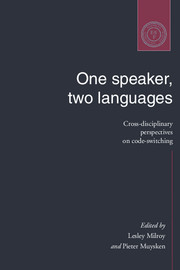Book contents
- Frontmatter
- Contents
- Notes on contributors
- Acknowledgments
- 1 Introduction: code-switching and bilingualism research
- Part one Code-switching in institutional and community settings
- Part two Code-switching and social life
- Part three Grammatical constraints on code-switching
- Part four Code-switching in bilingual development and processing
- 12 A psycholinguistic approach to code-switching: the recognition of guest words by bilinguals
- 13 Code-switching in bilingual first language acquisition
- 14 The code-switching behaviour of adults with language disorders – with special reference to aphasia and dementia
- 15 Conclusion: code-switching research as a theoretical challenge
- Index
12 - A psycholinguistic approach to code-switching: the recognition of guest words by bilinguals
Published online by Cambridge University Press: 05 June 2012
- Frontmatter
- Contents
- Notes on contributors
- Acknowledgments
- 1 Introduction: code-switching and bilingualism research
- Part one Code-switching in institutional and community settings
- Part two Code-switching and social life
- Part three Grammatical constraints on code-switching
- Part four Code-switching in bilingual development and processing
- 12 A psycholinguistic approach to code-switching: the recognition of guest words by bilinguals
- 13 Code-switching in bilingual first language acquisition
- 14 The code-switching behaviour of adults with language disorders – with special reference to aphasia and dementia
- 15 Conclusion: code-switching research as a theoretical challenge
- Index
Summary
Introduction
Code-switching has received considerable attention in recent years from linguists and sociolinguists, and it is no surprise, therefore, that researchers in the other fields of linguistics, such as psycholinguistics and neurolinguistics, should show interest in the phenomenon (see Harris 1992 and Vaid 1986, for recent edited books covering these areas). In what follows, we will first briefly review past work in the psycholinguistics of bilingualism and show how the language mode a bilingual is in when communicating (the monolingual mode or the bilingual mode) needs to be taken into account when studying language processing. We will then focus on a particular aspect of perception and comprehension in the bilingual language mode: the lexical access of code-switches and borrowings. We will describe a number of studies aimed at getting a better understanding of this process and will end with a model of guest word recognition. Before proceeding, though, it is important that we say a few words on how we view the bilingual person.
We will call ‘bilingual’ those people who use two, or more, languages (or dialects) in their everyday lives. Bilinguals are not the sum of two complete or incomplete monolinguals but have a unique and specific linguistic configuration. They have developed competencies in their languages to the extent required by their needs and those of the environment. They normally use their languages – separately or together – for different purposes, in different domains of life, with different people.
Information
- Type
- Chapter
- Information
- One Speaker, Two LanguagesCross-Disciplinary Perspectives on Code-Switching, pp. 259 - 275Publisher: Cambridge University PressPrint publication year: 1995
Accessibility standard: Unknown
- 46
- Cited by
